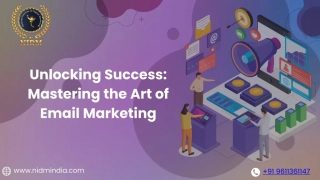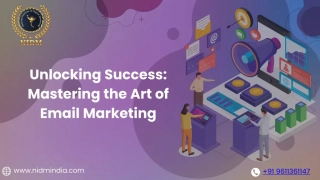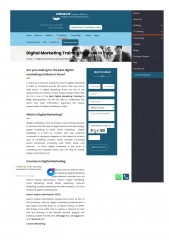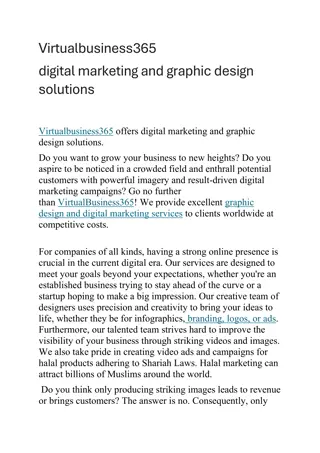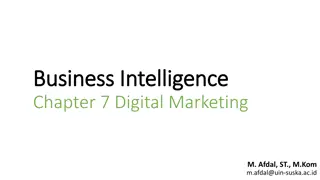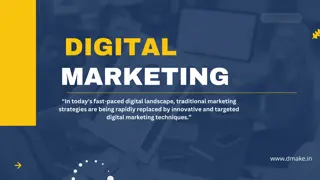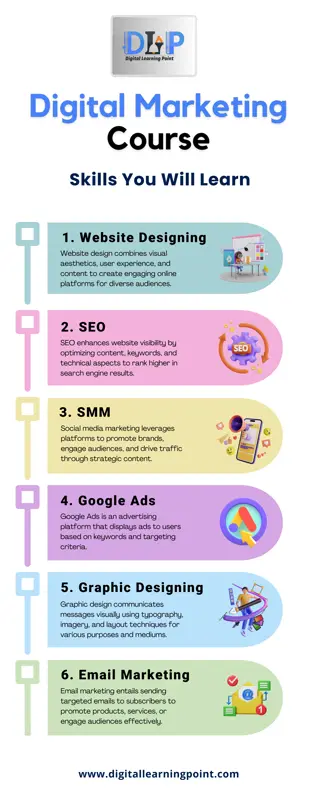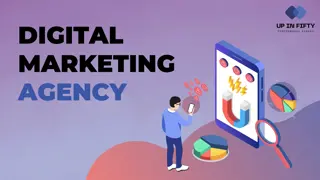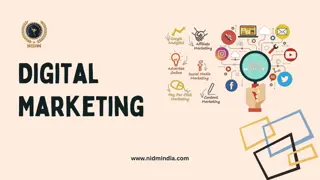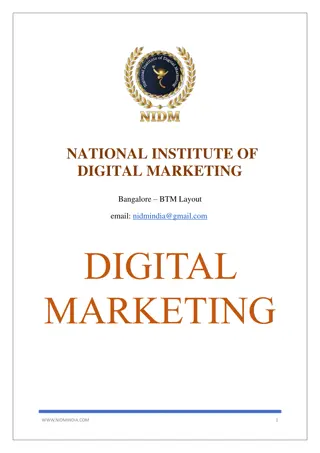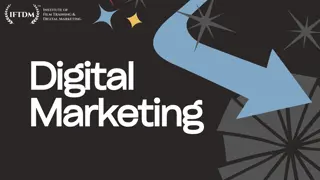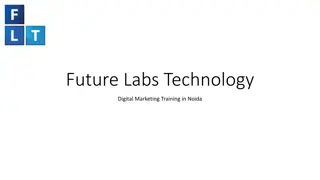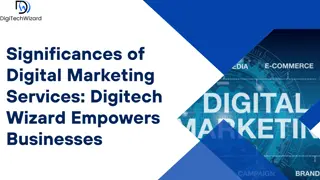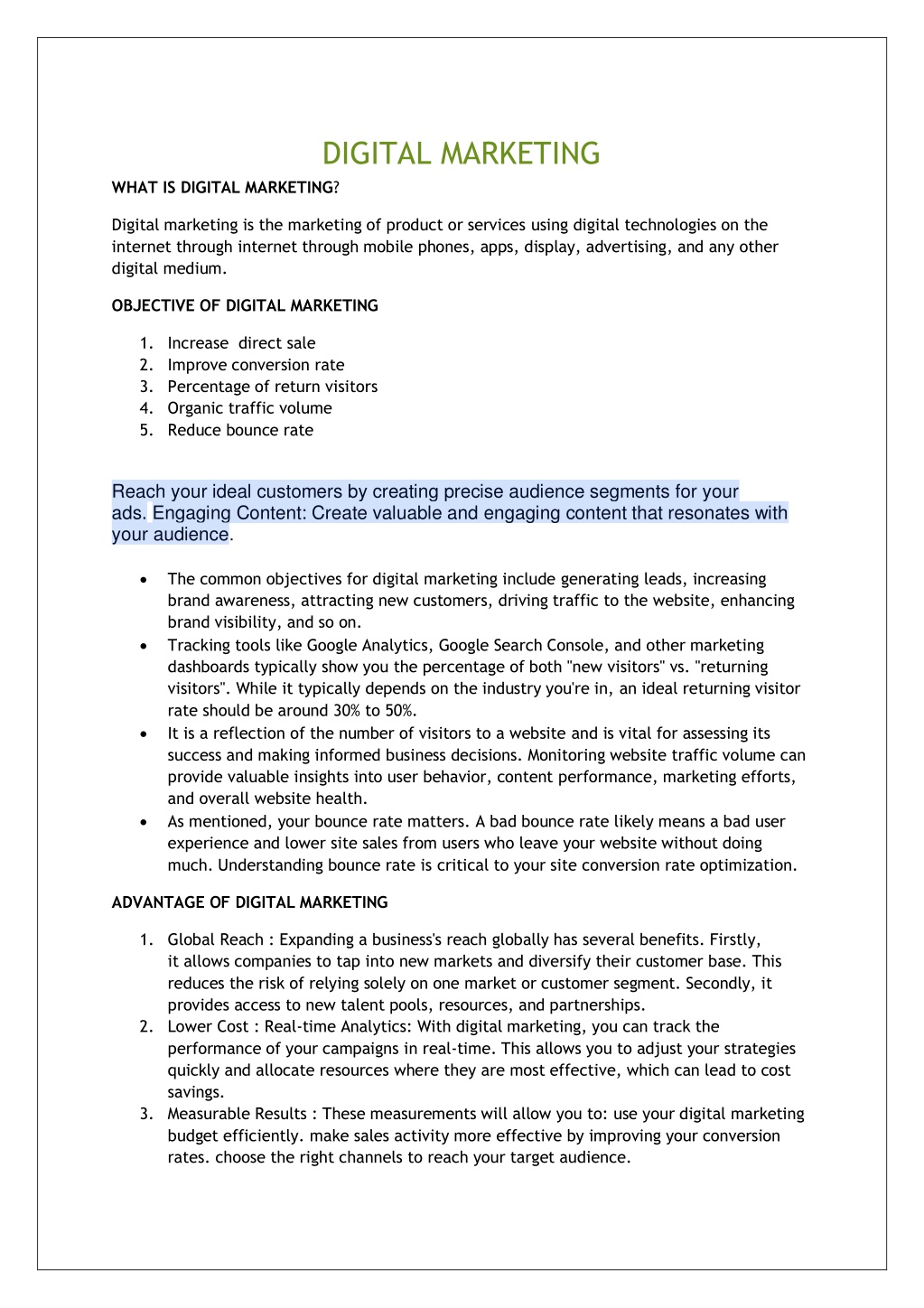
DIGITAL MARKETING (1)
Digital marketing refers to the use of digital channels, platforms, and technologies to promote products, services, or brands to a target audience. Unlike traditional marketing, which relies on physical mediums like print ads, billboards, and televis
Download Presentation

Please find below an Image/Link to download the presentation.
The content on the website is provided AS IS for your information and personal use only. It may not be sold, licensed, or shared on other websites without obtaining consent from the author. Download presentation by click this link. If you encounter any issues during the download, it is possible that the publisher has removed the file from their server.
E N D
Presentation Transcript
DIGITAL MARKETING WHAT IS DIGITAL MARKETING? Digital marketing is the marketing of product or services using digital technologies on the internet through internet through mobile phones, apps, display, advertising, and any other digital medium. OBJECTIVE OF DIGITAL MARKETING 1.Increase direct sale 2.Improve conversion rate 3.Percentage of return visitors 4.Organic traffic volume 5.Reduce bounce rate Reach your ideal customers by creating precise audience segments for your ads. Engaging Content: Create valuable and engaging content that resonates with your audience. The common objectives for digital marketing include generating leads, increasing brand awareness, attracting new customers, driving traffic to the website, enhancing brand visibility, and so on. Tracking tools like Google Analytics, Google Search Console, and other marketing dashboards typically show you the percentage of both "new visitors" vs. "returning visitors". While it typically depends on the industry you're in, an ideal returning visitor rate should be around 30% to 50%. It is a reflection of the number of visitors to a website and is vital for assessing its success and making informed business decisions. Monitoring website traffic volume can provide valuable insights into user behavior, content performance, marketing efforts, and overall website health. As mentioned, your bounce rate matters. A bad bounce rate likely means a bad user experience and lower site sales from users who leave your website without doing much. Understanding bounce rate is critical to your site conversion rate optimization. ADVANTAGE OF DIGITAL MARKETING 1.Global Reach : Expanding a business's reach globally has several benefits. Firstly, it allows companies to tap into new markets and diversify their customer base. This reduces the risk of relying solely on one market or customer segment. Secondly, it provides access to new talent pools, resources, and partnerships. 2.Lower Cost : Real-time Analytics: With digital marketing, you can track the performance of your campaigns in real-time. This allows you to adjust your strategies quickly and allocate resources where they are most effective, which can lead to cost savings. 3.Measurable Results : These measurements will allow you to: use your digital marketing budget efficiently. make sales activity more effective by improving your conversion rates. choose the right channels to reach your target audience.
4.Personalisation : These measurements will allow you to: use your digital marketing budget efficiently. make sales activity more effective by improving your conversion rates. choose the right channels to reach your target audience. 5.Openness : Customer openness refers to the degree of access that customers6 have to a platform, and what they are allowed to do. 6.Social currency : Social currency is a way to leverage the way people interact, buy, sell and promote on social media to ultimately grow your brand. What Is Social Currency? Social currency is basically influence currency. There's a monetary value to a brand's followers, likes, comments, shares and views. 7.Improved conversion rates : Digital marketing allows businesses to target specific audiences based on demographics, interests, and behaviors, thus increasing the chances of converting those leads into customers. DISADVANTAGES OF DIGITAL MARKETING 1.Security and Privacy Concerns. As with everything that goes through the internet, digital marketing is also susceptible to security and privacy threats. 2.High competition. While you can reach a global audience with digital marketing, you are also up against global competition. 3.Negative Feedback. Though by itself it's not necessarily a disadvantage, some customers can be very rude and leave nasty comments. 4.Dependability on technology. Digital marketing depends on customers' access to the internet and your mastery of the digital domain 5.Time consuming. Tasks such as optimising online advertising campaigns and creating marketing content can take up a lot of time. CONTENTS OF DIGITAL MARKETING i. Search engine optimization( seo ) : Search engine optimization is the process of improving the quality and quantity of website traffic to a website or a web page from search engines. SEO targets unpaid traffic rather than direct traffic or paid traffic. ii. Content marketing : Content marketing is a form of marketing focused on creating, publishing, and distributing content for a targeted audience online iii. Social media marketing : Social media marketing is the use of social media platforms and websites to promote a product or service. Although the terms e- marketing and digital marketing are still dominant in academia, social media marketing is becoming more popular for both practitioners and researchers iv. Pay per click (ppc ) : Pay-per-click (PPC) is an online advertising model in which an advertiser pays a publisher every time an advertisement link is clicked on. v. Affiliate marketing : . Affiliate marketing is a type of digital marketing in which companies reach out to third party websites to advertise their products vi. Email marketing : Email marketing is the practice of sending promotional and informational emails to build relationships with your audience,




